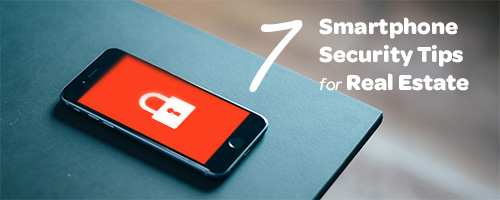You are viewing our site as an Agent, Switch Your View:
Agent | Broker Reset Filters to Default Back to List7 Smartphone Security Tips for Real Estate
October 06 2014

As a real estate professional, your smartphone is undoubtedly your most important possession. It's your mobile office, your primary means of communication, your Rolodex, your weather forecast, your camera and more.
But with this reliance on one device comes risks. A lost or stolen phone can potential compromise our most important business data, your sensitive client information – even your own identity.
Reduce your risk by following these 7 smartphone security tips that work whether you are an iOS or Android user.
1. Use a device PIN or password
While this might seem like a no-brainer more than half of smartphone users don't use a pin, password or any other type of locking mechanism. Make sure you keep a lock on at all times to create a first line of defense between people that have physical access to your device and the data stored on it. Make sure to also change this lock periodically in the event that someone has glanced your password over your shoulder.
2. Use a GPS-aided phone finder
In the event your phone goes missing, it is important to be able to retrieve it as quickly as possible. Most smartphone makers offer some sort of web-based tool to geo-locate your device, call it or remotely wipe it should you suspect it has fallen into the hands of crooks. Here are your options for each device maker:
- iOS: Find My iPhone
- Android: Android Device Manager
- Windows: Find Phone (click 'Find Phone' in the top-right menu)
3. Don't use unsecured Wi-Fi or Bluetooth
They say "home is where the Wi-Fi connects automatically" and real estate professionals should heed this warning! Coffee shops, airports, restaurants or transit services might offer complimentary Wi-Fi, but unlike your home network you cannot vouch for its security. Avoid using these services if possible since any data transmitted over them (like your business or banking information) is at risk of being intercepted.
4. Defend your phone against Malware
Phones are just as susceptible to the same kind of malware and viruses that your desktop computers are and they need the same level of protection. The problem appears to be less hazardous for iOS users, thanks to Apple's strict control over the App Store. However, the open-source nature of Android makes them a lot more vulnerable, as malicious apps can be loaded onto the device without being checked by Google first. In both cases, this is something that can be countered through the use of mobile antivirus software application from the likes of McAfee, AVG, Norton or another reputable antivirus company – all of which can be found in the App Store.
5. Consider a password manager
Chances are if you are using your phone for your real estate business, you have multiple apps or websites you need to login to on a regular basis. If so, consider the use of a password manager like 1Password, which works across all platforms and keeps your passwords – and by extension your sensitive data – safe, encrypted and secure.
6. Keep your phone software up-to-date
There is a reason that smartphone makers always update their devices with new software – to patch security flaws and bugs that put your information at risk. Make sure that you do your part to close these security loopholes by updating to the latest operating software. Most manufacturers allow you to set your phone to check for updates automatically, so always make sure this option is enabled on your device.
7. Use a digital "vault" for super-sensitive information
If you have information on your smartphone that is too important to keep with the rest of your documents – be it contracts, signatures or loan documents – consider keeping them in a separate area of your smartphone. On iOS you can use an app like The Vault or NQ Mobile Security on Android, which provides you with encrypted and password-protected storage for documents, images or videos.
Do you have any other smartphone security tips for real estate professionals that you would like to share? Comment below!
To view the original article, visit the Point2 Agent blog.









